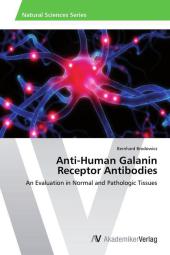 Neuerscheinungen 2013Stand: 2020-01-07 |
Schnellsuche
ISBN/Stichwort/Autor
|
Herderstraße 10
10625 Berlin
Tel.: 030 315 714 16
Fax 030 315 714 14
info@buchspektrum.de |

Bernhard Brodowicz
Anti-Human Galanin Receptor Antibodies
An Evaluation in Normal and Pathologic Tissues
2013. 112 S. 220 mm
Verlag/Jahr: AV AKADEMIKERVERLAG 2013
ISBN: 3-639-45603-3 (3639456033)
Neue ISBN: 978-3-639-45603-5 (9783639456035)
Preis und Lieferzeit: Bitte klicken
The neuropeptide galanin is involved in the regulation of several physiological processes, which are mediated via three different G-protein-coupled receptors (GPCRs). The galanin receptors show distinct but overlapping expression in the central nervous system and in the periphery. GPCRs have been described as major drug targets for various human diseases. Therefore, the determination of the cellular and subcellular localization of galanin receptors is of high interest. Antibodies are a valuable tool to study the distribution of receptors of interest. Even though there are several antibodies raised against the different galanin receptor subtypes commercially available, it has been demonstrated that lack of selectivity appears to be the rule rather than the exception for antibodies against these GPCRs. Therefore, the specificity of several commercially available antibodies to human galanin receptors was evaluated in immunoblotting and immunohistochemistry. One out of two anti-GalR1 antibodies, one out of two anti-GalR2 antibodies and one out of three tested anti-GalR3 antibodies showed specific staining in Western blot analysis and immunohistochemistry. Using these antibodies it was possible for the first time and in detail to illustrate the cellular expression and localization of the three galanin receptor subtypes in numerous normal and pathologic human tissues.
studied genetics and molecular biology at the University of Salzburg, Austria. After completing his masterīs thesis at the Laura Bassi Centre of Expertise THERAPEP, Research Laboratory of the Childrenīs Hospital Salzburg he started to work as a research associate for the Clinical Research Center Salzburg at the Childrenīs Hospital to get his PhD.


